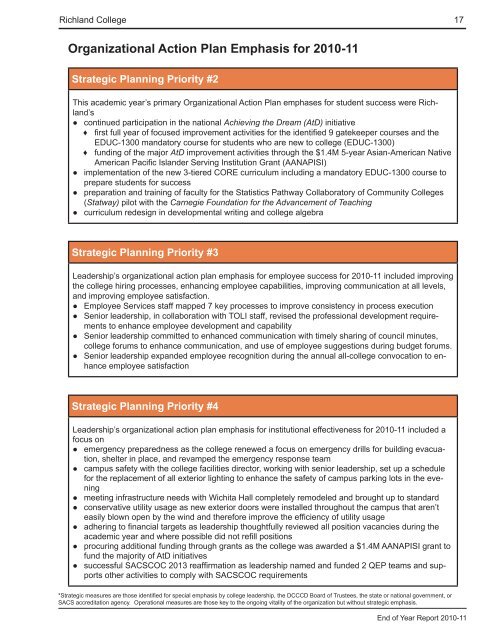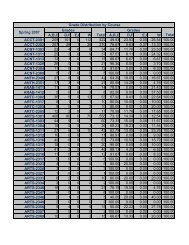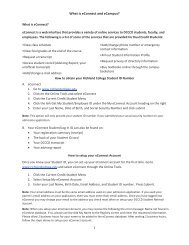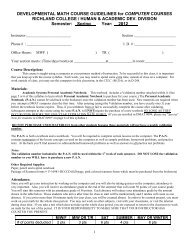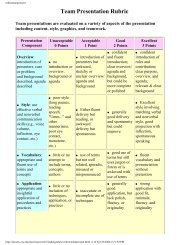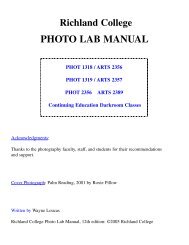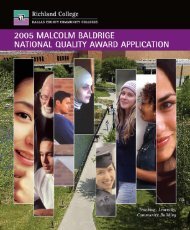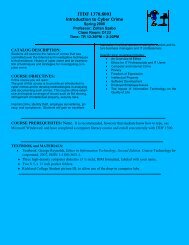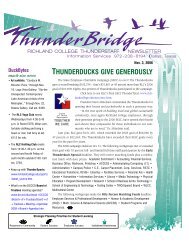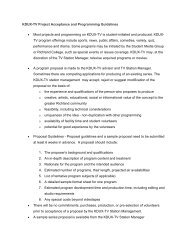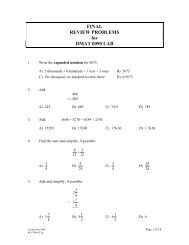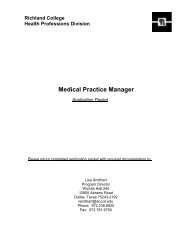End of Year Report - Richland College
End of Year Report - Richland College
End of Year Report - Richland College
You also want an ePaper? Increase the reach of your titles
YUMPU automatically turns print PDFs into web optimized ePapers that Google loves.
<strong>Richland</strong> <strong>College</strong> 17<br />
Organizational Action Plan Emphasis for 2010-11<br />
Strategic Planning Priority #2<br />
This academic year’s primary Organizational Action Plan emphases for student success were <strong>Richland</strong>’s<br />
●●<br />
continued participation in the national Achieving the Dream (AtD) initiative<br />
♦♦<br />
first full year <strong>of</strong> focused improvement activities for the identified 9 gatekeeper courses and the<br />
EDUC-1300 mandatory course for students who are new to college (EDUC-1300)<br />
♦♦<br />
funding <strong>of</strong> the major AtD improvement activities through the $1.4M 5-year Asian-American Native<br />
American Pacific Islander Serving Institution Grant (AANAPISI)<br />
●●<br />
implementation <strong>of</strong> the new 3-tiered CORE curriculum including a mandatory EDUC-1300 course to<br />
prepare students for success<br />
●●<br />
preparation and training <strong>of</strong> faculty for the Statistics Pathway Collaboratory <strong>of</strong> Community <strong>College</strong>s<br />
(Statway) pilot with the Carnegie Foundation for the Advancement <strong>of</strong> Teaching<br />
●●<br />
curriculum redesign in developmental writing and college algebra<br />
Strategic Planning Priority #3<br />
●●<br />
●●<br />
Leadership’s organizational action plan emphasis for employee success for 2010-11 included improving<br />
the college hiring processes, enhancing employee capabilities, improving communication at all levels,<br />
and improving employee satisfaction.<br />
●●<br />
Employee Services staff mapped 7 key processes to improve consistency in process execution<br />
●●<br />
Senior leadership, in collaboration with TOLI staff, revised the pr<strong>of</strong>essional development requirements<br />
to enhance employee development and capability<br />
Senior leadership committed to enhanced communication with timely sharing <strong>of</strong> council minutes,<br />
college forums to enhance communication, and use <strong>of</strong> employee suggestions during budget forums.<br />
Senior leadership expanded employee recognition during the annual all-college convocation to enhance<br />
employee satisfaction<br />
Strategic Planning Priority #4<br />
Leadership’s organizational action plan emphasis for institutional effectiveness for 2010-11 included a<br />
focus on<br />
●●<br />
emergency preparedness as the college renewed a focus on emergency drills for building evacuation,<br />
shelter in place, and revamped the emergency response team<br />
●●<br />
campus safety with the college facilities director, working with senior leadership, set up a schedule<br />
for the replacement <strong>of</strong> all exterior lighting to enhance the safety <strong>of</strong> campus parking lots in the evening<br />
●●<br />
meeting infrastructure needs with Wichita Hall completely remodeled and brought up to standard<br />
●●<br />
conservative utility usage as new exterior doors were installed throughout the campus that aren’t<br />
●●<br />
●●<br />
●●<br />
easily blown open by the wind and therefore improve the efficiency <strong>of</strong> utility usage<br />
adhering to financial targets as leadership thoughtfully reviewed all position vacancies during the<br />
academic year and where possible did not refill positions<br />
procuring additional funding through grants as the college was awarded a $1.4M AANAPISI grant to<br />
fund the majority <strong>of</strong> AtD initiatives<br />
successful SACSCOC 2013 reaffirmation as leadership named and funded 2 QEP teams and supports<br />
other activities to comply with SACSCOC requirements<br />
*Strategic measures are those identified for special emphasis by college leadership, the DCCCD Board <strong>of</strong> Trustees, the state or national government, or<br />
SACS accreditation agency. Operational measures are those key to the ongoing vitality <strong>of</strong> the organization but without strategic emphasis.<br />
<strong>End</strong> <strong>of</strong> <strong>Year</strong> <strong>Report</strong> 2010-11


